Dear Zazie, Here is today’s Lovers’ Chronicle from Mac Tag dedicated to his muse. Do you know what it is to be a lover? To be half of a whole? Rhett
The Lovers’ Chronicle
Dear Muse,
© copyright 2021 mac tag/cowboy coleridge all rights reserved
© copyright 2020 mac tag/cowboy coleridge all rights reserved
This one is a tribute to Venice and Venetian music. One of the great cities of the world for lovers. Today is the anniversary of the death of the Venetian composer Baldassare Galuppi. His music served as inspiration for Robert Browning‘s poem, A Toccata of Galuppi’s, which is not a love poem but served as inspiration for the Poem of the Day. Browning’s poem inspired a 1989 setting, in modern idiom but with musical quotations from Galuppi’s works, by the composer Dominick Argento. I tried to find it for the Song of the Day, but I could not so I went with another Venetian composer for the SOD. Hope you like,
Venetian Lovers
This music, good yet sad to hear
I can hardly misconceive you
With divided devotions and mixed emotions
I take the meanin’, with a heavy heart…
They lived in Venice
Where the merchants were the kings,
Where Saint Mark’s is and the Grand Canal,
Where the Doges used to wed the sea with rings
Where they lived and laughed and loved
Where they made up fresh adventures
Where they took their pleasure
When the sea was warm in May
The lady such a beauty, lips so red,
Her neck, her face all flush on their bed,
Her chest poundin’ where he laid his head
Well, it was all graceful for them
They would break talk off and work
Her with her brush, him with his pen,
While the music played and filled the air
The melody so plaintive, sigh on sigh
Told them somethin’ Must this end
Love must last We can but try
Are you happy And are you still as happy
Yes. And you Then, more kisses
When as many as could be seemed so few
Passion persistent till it must be answered to
Then they resumed their pleasure
And resumed their fulfillment of each other
Till in due time, Time stepped tacitly
And took them where they never see the sun.
To reason, to take a stand, to not swerve,
Triumph over a secret wrung from some reserve,
In comes cold music till it creeps through every nerve
Ghostly creakin’, dust and ashes, dead and done with
Venice spent what Venice earned
The soul, doubtless, is immortal
Where a soul can be discerned
Souls shall rise in their design
As for Venice and the lovers, merely born to bloom
There they bore their concupiscence, mirth and folly
What of soul is left, when the kissin’ has to stop
Dust and ashes so you wrote it,
And I want the heart to scold
Do you know what it is to be a lover
Do you know what it is to be half of a whole
I feel cold and grown old
© copyright 2013 mac tag/Cowboy Coleridge all rights reserved
The Song of the Day is “La virtù dei strali d’Amore“ (The Power of Cupid’s Arrows) by Francesco Cavalli.
On this day in 1843 – The comic opera “Don Pasquale” by the Italian composer Gaetano Donizetti had its first performance in Paris. To this day it remains one of his best-loved and most often-performed works.
| Don Pasquale | |
|---|---|
| Opera by Gaetano Donizetti | |
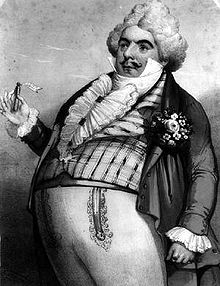
Luigi Lablache as Don Pasquale in the 1843 premiere
|
|


Donizetti had just returned to Paris from Vienna in the autumn of 1842 and it was there that it was suggested to him by Jules Janin, the newly appointed director of the Théâtre-Italien, that he might compose a new opera for that house. Janin prepared a formal proposal on 27 September, but while no specific subject nor title was mentioned, Janin suggested that it should be a new opera buffa tailored to the talents of some major singers including Giulia Grisi, Antonio Tamburini, and Luigi Lablache.
Synopsis
=== Overture=== The music is suggestive of an opera of this type, bright,and lively, it starts with plenty of percussion and brass instruments. After a while, the ambiance changes to suggest a party. The overture ends with a satisfactory finale.Time: Early 19th century- Place: Rome
Act 1
Scenes 1–3: A room in the home of Don Pasquale, at 9 o’clock
Ernesto has refused the woman that his uncle Don Pasquale had found for him, and as a result is to be disinherited. Ernesto declares his devotion to the young – but poor – widow Norina. In view of Ernesto’s determination, Don Pasquale decides to marry in old age to produce his own heir, and anxiously awaits the arrival of his physician, Dr. Malatesta, who is determined to teach Don Pasquale how foolish he is being, but has been pretending to search for a suitable bride. Malatesta, confronted with Pasquale’s impatience, mutters that he is a buffoon, but proceeds to describe the attributes of the bride-to-be (Bella siccome un angelo – “Beautiful like an angel”). Honest, modest and sweet – when pressed, Malatesta reveals she is in fact his sister. Overcome with joy, Pasquale demands to meet her at once, and sends Malatesta to fetch her, before singing of the love that has gripped him (Ah, un foco insolito – “A sudden fire”).
Ernesto comes back and pleads with the Don to consult with his friend Malatesta – when he hears that Malatesta supposedly supports Pasquale, he is amazed at this apparent betrayal (Mi fa il destino mendico – “Fate has made a beggar of me”). Ernesto determines to elope and writes to tell Norina that all is lost.
Scenes 4–5: An apartment in the home of Norina
Norina sits alone, reading a book. She recites a passage, before laughing at the situation described and reflecting on her own temperament (So anch’io la virtù magica – I too know your magical virtues”). She is in cahoots with Dr. Malatesta and impatiently waits for him to come and explain his plan at which he had only hinted. A servant delivers the letter from Ernesto, which she quickly reads and is instantly dismayed.
Malatesta arrives to explain the stratagem, but Norina cuts him off and hands him the letter, which he reads aloud: Ernesto has announced his intention to leave Rome, and Europe altogether. Malatesta reassures her, saying that he has adapted his plan: Norina shall play the part of Malatesta’s sister. Having arranged for his cousin to act as a notary, they will easily deceive the Don. Norina consents to play her part in the deception, and they discuss her strategies in a lively duet (Pronta son; purch’io non manchi – “I am ready; if I do not miss”).
Act 2

A salon in the home of Don Pasquale
Ernesto is alone: lamenting his fate, he considers his decision to leave Rome (Cercherò lontana terra – “I shall seek a distant land”). He leaves the room just as Pasquale enters, dressed in his outdated finery, along with his servants, to whom he gives instructions to admit Malatesta on his arrival. He parades around in his grand costume, hoping it will conceal his advancing years.
Malatesta arrives with Norina in tow, and introduces her to Pasquale as his sister, Sofronia, fresh out of the convent. Pasquale is smitten, and Norina plays the part of a dutiful, modest and submissive lady, to Pasquale’s satisfaction. Norina consents to the proposed marriage, which delights Pasquale. He wants to send for the notary to conduct the ceremony straight away – conveniently, Malatesta has brought one along, who waits in the antechamber.
Malatesta fetches the supposed notary, as servants arrange a table. Taking his seat, the “notary” writes out a marriage contract as dictated by Malatesta and Pasquale (Fra da una parta – “Between, on one hand”), where the Don bequeaths all his estate to be administrated by Sofronia. The contract is quickly drawn up: Pasquale signs but, before Norina can affix her signature, Ernesto bursts in. Intending to say a final farewell, he is amazed to see Norina about to marry Pasquale. However, Malatesta persuades him not to say anything (Figliol non mi far scene – “Son, don’t make a scene”), and he is forced to act as the final witness much to Don Pasquale’s delight.
As soon as the contract is signed, Norina abandons her pretence of docility, and refuses Pasquale’s embrace. She announces her intention to teach him manners, and to have Ernesto as a gallant to accompany her on evening strolls. Pasquale is horrified at this transformation, while Malatesta and Ernesto can barely conceal their amusement (È rimasto là impietrato – “He stands there, petrified”). Summoning the household staff, Norina recites a long list of demands – more servants (young and handsome at that), carriages and horses, furniture – and instructs them to spare no expense doubling all their wages. Pasquale is stricken at his misfortune, so Malatesta urges him to go to bed.
Act 3

Scenes 1–5: A room in the home of Don Pasquale
Pasquale sits in a room, surrounded by piles of newly purchased jewels, dresses and the like, as the servants bustle in and out of Norina’s apartment (I diamanti presto presto – “The diamonds, quickly, quickly”). Dismayed by the piles of bills and invoices, the Don summons the courage to confront his tyrannical new wife. Norina emerges, dressed to go out. He attempts to reason with her, but she pays little heed (Signorina, in tanta fretta – “Madam, where are you off to in such a hurry”). He suggests that if she leaves, he may not allow her to return, an idea that she meets with patronising insincerity (Via, caro sposino – “There, there, dear little husband”) but the discussion ends in her slapping him. As she exits, she drops a note which Pasquale picks up and reads. The note is addressed to Sofronia, arranging a meeting in the garden with its unnamed, admiring author. Pasquale calls for a servant to summon Malatesta, before leaving the room.
The servants return and, amongst themselves, at once complain at the amount of work they are being made to do, and reveal how much they are enjoying the farcical drama developing between Pasquale and his new wife (Che interminabile andirivieni! – “Such endless coming and going!”). At the approach of Malatesta and Ernesto, however, they exit, assured of more entertainment to come. Malatesta reminds Ernesto of the finer points of their plan, and the latter leaves. The doctor moves forward to greet Don Pasquale, who tells him of Norina’s intended assignation, and his own plan to expose her unfaithfulness before a magistrate. Malatesta persuades him to moderate his plan and Pasquale, believing him an ally, consents to his conditions, while plotting his revenge on Norina (Aspetta, aspetta, cara sposina – “Wait, wait, dear little wife”).
Scenes 6–7: The garden, adjoining Pasquale’s house
In the garden, as night draws in, Ernesto sings of his love for Norina, as he waits for her arrival (Com’è gentil – “How lovely”). At last, Norina emerges, and they express their love: (Tornami a dir che m’ami – “Tell me once more that you love me”). Don Pasquale and Malatesta have observed and, as they reveal themselves, Ernesto covers himself with a cloak and runs to the house. Pasquale tries to confront Norina – he has caught her in flagrante – but this only provokes a fight that leaves the Don spluttering. She refuses to leave at his demand, so Malatesta, as per his agreement with Pasquale, takes over. Pretending to negotiate with Norina/Sofronia, he tells Pasquale that the only way to make her leave will be to allow Ernesto to marry his beloved, whom “Sofronia” apparently despises. Pasquale consents, and calls out to the house, from which Ernesto and the servants emerge. He instructs Ernesto to send for his would-be bride, but Malatesta reveals that Norina is in fact the woman Pasquale thinks he married, while the real Sofronia remains in a convent. All are reconciled, and the moral of the story – not to marry in old age – is revealed in a playful quartet (La moral di tutto questo – “The moral of all this”).
| August Macke | |
|---|---|

August Macke, Self-portrait, 1906, oil on canvas
|
|
Today is the birthday of August Macke (Meschede 3 January 1887 – 26 September 1914 near Perthes-lès-Hurlus, France); one of the leading members of the German Expressionist group Der Blaue Reiter (The Blue Rider). He lived during a particularly innovative time for German art: the development of the main German Expressionist movements as well as the arrival of the successive avant-garde movements which were forming in the rest of Europe. Like a true artist of his time, Macke knew how to integrate into his painting the elements of the avant-garde which most interested him.
Macke’s career was cut short by his early death in the second month of the First World War at the front in Champagne, France. His final painting, Farewell, depicts the mood of gloom that settled after the outbreak of war. This was also the same year that he painted the famous painting, Türkisches Café in München (1914).

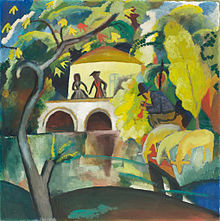

-

The artist’s wife in blue hat, 1909
-
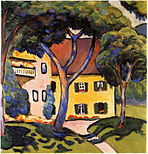
Staudacher’s house at the Tegernsee, 1910
-
Tegernsee landscape, 1910, Germanisches Nationalmuseum
-

Landschaft am Tegernsee mit lesendem Mann, 1910
-
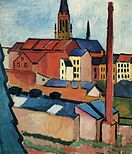
St. Mary’s with houses and chimney (Bonn), 1911, Kunstmuseum Bonn
-

Vegetable fields, 1911, Museum Ludwig, Cologne, Germany
-
Little Walter`s Toys, 1912, Städel
-
Two girls, 1913, Städelsches Kunstinstitut
-

Promenade, 1913
-

Lady in a Green Jacket, 1913, Museum Ludwig, Cologne, Germany
-
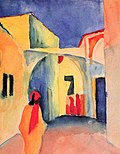
View into a lane, 1914, watercolor
-

Kairouan (III), 1914, watercolor, Westphalian State Museum for Art and Cultural History, Münster
-
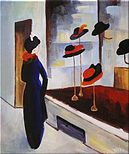
Hutladen III, 1914
-
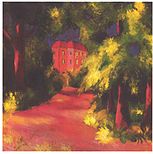
Red house in the park, 1914
mac tag
No boughs have withered because of the wintry wind;
The boughs have withered because I have told them my dreams
– W. B. Yeats
Perhaps some day I’ll crawl back home, beaten, defeated. But not as long as I can make stories out of my heartbreak, beauty out of sorrow. – Sylvia Plath

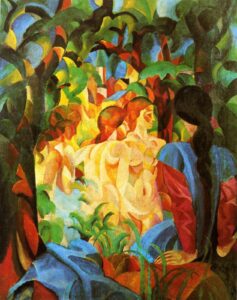
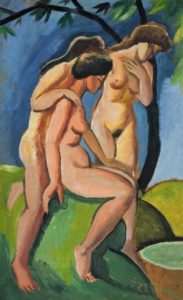

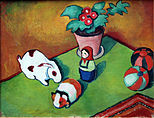
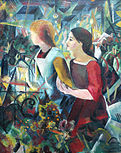
No Comments on "The Lovers’ Chronicle 3 January – venetian lovers – premiere of Donizetti’s Don Pasquale – art by August Macke"